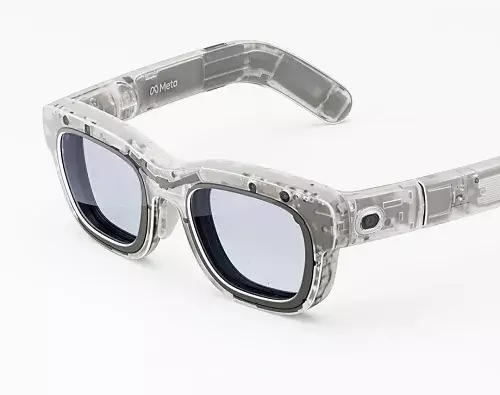Meta’s foray into augmented reality (AR) technology represents a pivotal shift in how we interact with the digital world. As the company unveils details about its upcoming Orion AR glasses, the implications of this device extend far beyond mere functionality; they challenge our conventional understanding of personal computing. The glasses are truly poised to redefine our everyday experiences, integrating them seamlessly with advanced technology. However, the pathway to this future is lined with both opportunities and formidable challenges.
Design Challenges and Technological Advances
The current prototype of the Orion AR glasses demonstrates significant technological strides, albeit with some noticeable design limitations. Meta has opted for a “puck”—an external unit designed to enhance computing power and battery life, which unfortunately adds to the bulk of the user experience. While it is commendable that Meta is striving to slim down the frames for an aesthetically appealing look, the glasses still appear somewhat bulky in their current form. This stark contrast raises questions about whether they can be integrated into daily fashion without arousing skepticism from prospective users.
However, acknowledging the rapid advancements in design and technology within the AR sector, it is quite possible that Meta will overcome these hurdles as the product develops. After all, the reality labs are hard at work evolving the form factor and making the device ideal for everyday use. Perhaps future iterations of the glasses will sport sleeker, more fashionable designs, following in the footsteps of consumer favorites like Ray-Ban’s smart glasses. Meta’s approach should focus on persuasive style, pairing technology with an appeal that resonates with the fashion-forward segment of the market.
The Role of AI in Augmented Reality
The incorporation of artificial intelligence into these smart glasses is especially captivating. As Meta emphasizes the integration of AI capabilities, the potential applications of such technology become endless, ranging from enhanced navigation assistance to real-time language translation. AI’s ability to process information instantaneously can significantly augment user interaction, creating experiences that were once confined to the realm of science fiction.
However, combining powerful computing capabilities and AI in a wearable format is fraught with challenges. Battery life and thermal management will play critical roles in whether these glasses can be used comfortably over extended periods. Addressing these concerns will be paramount as Meta seeks to offer a user-friendly experience that doesn’t compromise on performance.
Affordability: The Key to Widespread Adoption
One of Meta’s ambitious goals is to align the pricing of its Orion AR glasses with modern smartphone costs. CEO Mark Zuckerberg’s critical stance on Apple’s VisionPro’s exorbitant price raises an essential point: how can AR technology stay accessible to the masses? The distinction between high-end luxury and everyday practicality is crucial if Meta wishes to realize its vision of making AR glasses a staple in consumers’ lives.
While the current geopolitical landscape presents challenges for producing affordable technology, Meta appears committed to ensuring mass accessibility. The concept of recovering costs through various ad opportunities and subscription features shows an innovative approach to monetization. Consumers today are more willing to engage with technology that enhances their lives, especially if the initial financial barrier is minimized.
The Vision for the Future
As Meta pushes forward with its AR initiatives, CEO Mark Zuckerberg has expressed his conviction that wearable technology like AR glasses could eventually overshadow smartphones in importance. This assertion could resonate well beyond the tech community as consumers increasingly seek more intuitive, immersive ways to engage with digital content.
Nevertheless, the journey from concept to consumer-ready product is fraught with complexities. Logistics, market readiness, and consumer skepticism present real hurdles. Yet, if Meta can address these through effective design, pricing strategies, and innovative features, the Orion AR glasses may well become a cornerstone of the next computing revolution.
In a world rapidly evolving toward greater connectivity, Meta’s efforts to revolutionize augmented reality are not merely aspirational; they represent an ambition that reflects both the potential pitfalls and possibilities of an interconnected future. As the countdown to the scheduled 2027 release approaches, all eyes will likely be on Meta to see if they can fulfill this exciting promise.

